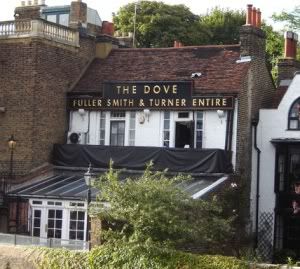 Or, more accurately I suppose, le Porter est prêt. The latest beer's had just about enough maturing time - in other words, I can't wait any longer for it. It's to a simple recipe I cobbled together myself, which I'll include at the end of this post.
Or, more accurately I suppose, le Porter est prêt. The latest beer's had just about enough maturing time - in other words, I can't wait any longer for it. It's to a simple recipe I cobbled together myself, which I'll include at the end of this post.There's a slightly dusty antiquarian glamour to porter. The father of stout (think Guinness), its popularity amongst porters at London markets during the early eighteenth century gave it its name. It's dark, hoppy and dry, not too strong (in its modern form anyway) and after pretty much dying out in the twentieth century (Whitbread destroyed their last porter ageing vat in 1918), it's experienced something of a revival in recent years.
Porter has its origins in a technological quick fix, an inauspicious beginning as a kind of beery fast food. Before, beer tended to be either 'mild' (young) or 'stale' (mature), there would be at least two barrels behind the bar, and drinkers would mix their beer to get the required balance of flavours. In some places, such as London, there would be as many as three beers: brown, pale and old, and all three could be mixed to make up a pint of 'three threads'.
Porter changed all this by achieving something that was like this mix of mild and stale, but which could be served from one barrel. So, an early name for porter was 'entire butt' or entire, a term you can still see on the sign for the Dove Inn on the Thames at Hammersmith in London:

Photograph by Fin Fahey, Wikimedia Commons.
Porter has its origins in a technological quick fix, an inauspicious beginning as a kind of beery fast food. Before, beer tended to be either 'mild' (young) or 'stale' (mature), there would be at least two barrels behind the bar, and drinkers would mix their beer to get the required balance of flavours. In some places, such as London, there would be as many as three beers: brown, pale and old, and all three could be mixed to make up a pint of 'three threads'.
Porter changed all this by achieving something that was like this mix of mild and stale, but which could be served from one barrel. So, an early name for porter was 'entire butt' or entire, a term you can still see on the sign for the Dove Inn on the Thames at Hammersmith in London:

Photograph by Fin Fahey, Wikimedia Commons.
London breweries started to serve this new beer from about 1720, for 1 1/2d per pint. Publicans could now avoid the expensive process of ageing beer in its cask, as well as the fiddle of having two on the go at once. And like an eighteenth century MacDonald's, this new fast drink took the capital by storm first and then spread across the country. It allowed the production of beer on an industrial scale - and made brewers very rich indeed. By 1812 the four biggest London breweries produced more than 120,000 barrels per year; in contrast London's biggest ale brewery produced 20,000 annually.
There's a darker side to porter's history. It was discovered in 1740 that porter matured successfully in large vats, with small surface area and great depth. The beer could mature for a long time while the surface area was small enough to minimise airborne infections. Vats were now constructed that produced 1,500 barrels of beer; Whitbread had by the nineteenth century vessels with 20,000 barrel capacities. There are stories of new vats being inaugurated with a dinner dance inside them - with as many as two hundred people attending. The arms race was brought to an end following a disaster at the Meux Brewery in 1814 where a vessel burst, killing eight people, demolishing buildings and causing chaotic scenes of people trying to collect the spilt beer from the streets.
Anyway, so much for the history. Our kegs are fortunately a little smaller than the deadly porter tuns groaning under the pressure, and aren't likely to demolish our house. And my recipe is a modern-style version rather than a historical porter - for which I'll go to the Durden Park Beer Club's book when I'm feeling brave enough. But still, it's a pretty good first attempt I reckon. It's dark with enough fruit to live with the hopping - and a nice, long coffee and chocolate finish. It's dry and very drinkable and I'm very happy with it.
Here's the recipe, quite a simple one:
Original Gravity: 1044
Mash
Pale Malt: 3,700g (77%)
Crystal Malt: 410g (8%)
Chocolate Malt: 228g (5%)
Black Malt: 184g (4%)
Copper
Invert sugar 278g (6%) - I just used partially inverted golden syrup
Goldings hops 50g (start of boil)
Fuggles hops 35g (start of boil)
Goldings hops 18g (last 15 mins)
Mash
water: 12 litres
temperature: 67c
2 hours
Boil
2 hours
Final Gravity: 1011
Yeast: I used Wyeast 1318 London Ale III
The two books which were invaluable for this post were: HA Monckton, A History of English Ale and Beer (London, 1966) and Ray Daniels, Designing Great Beers (Colorado, 1996 & 2000)
No comments:
Post a Comment